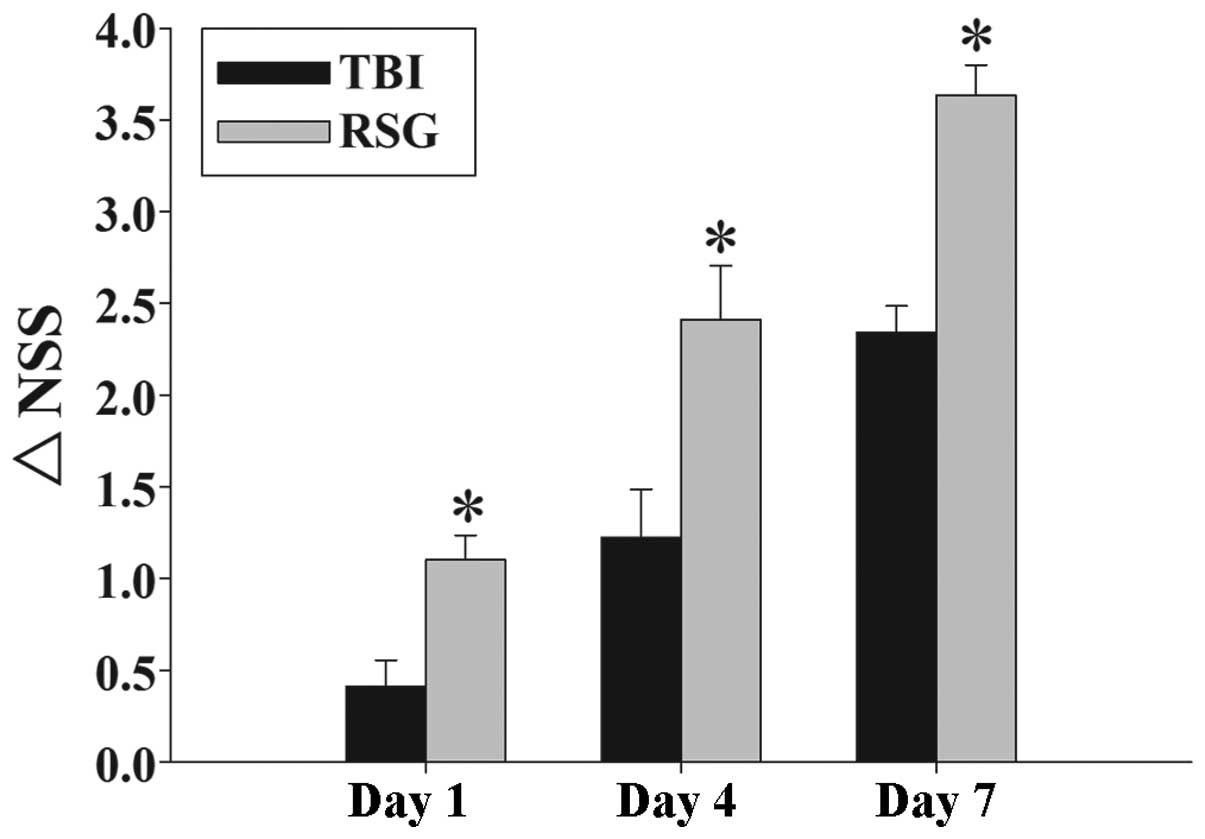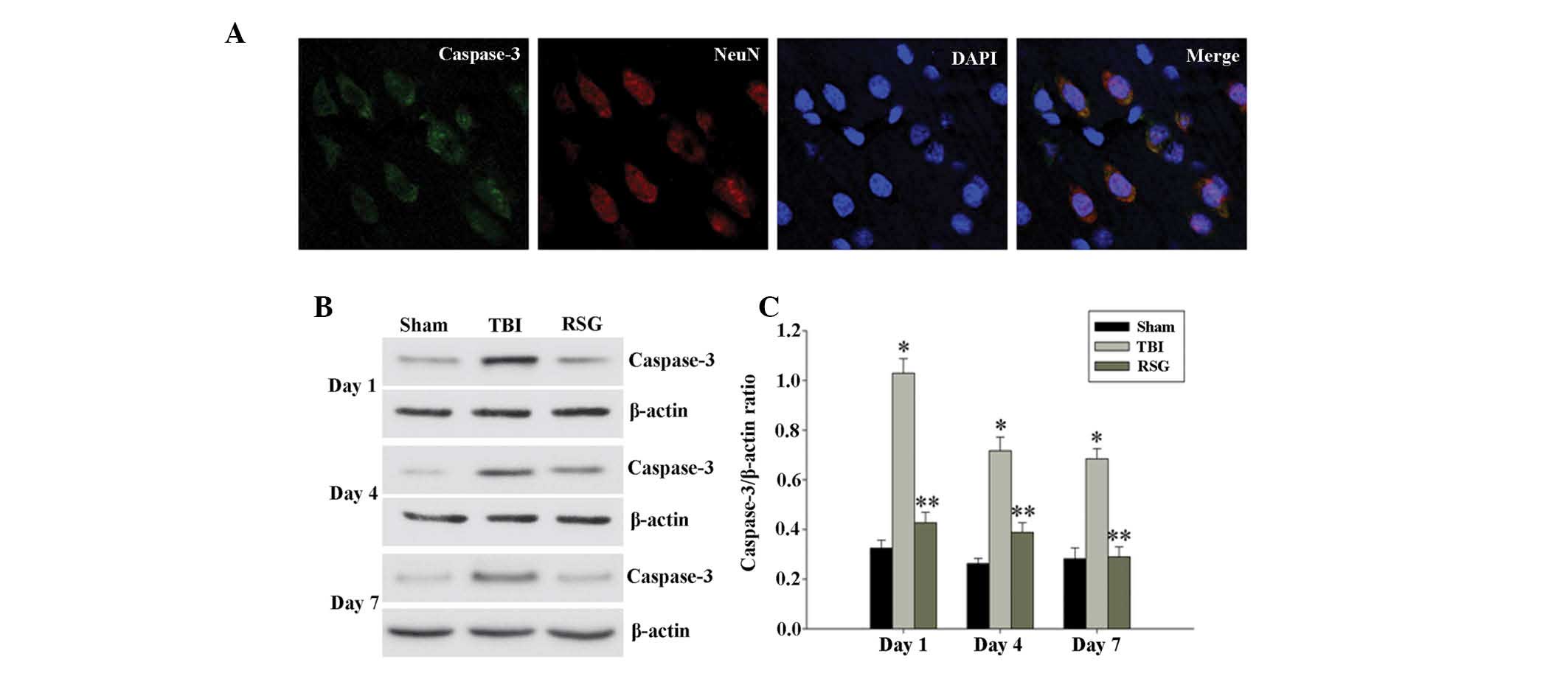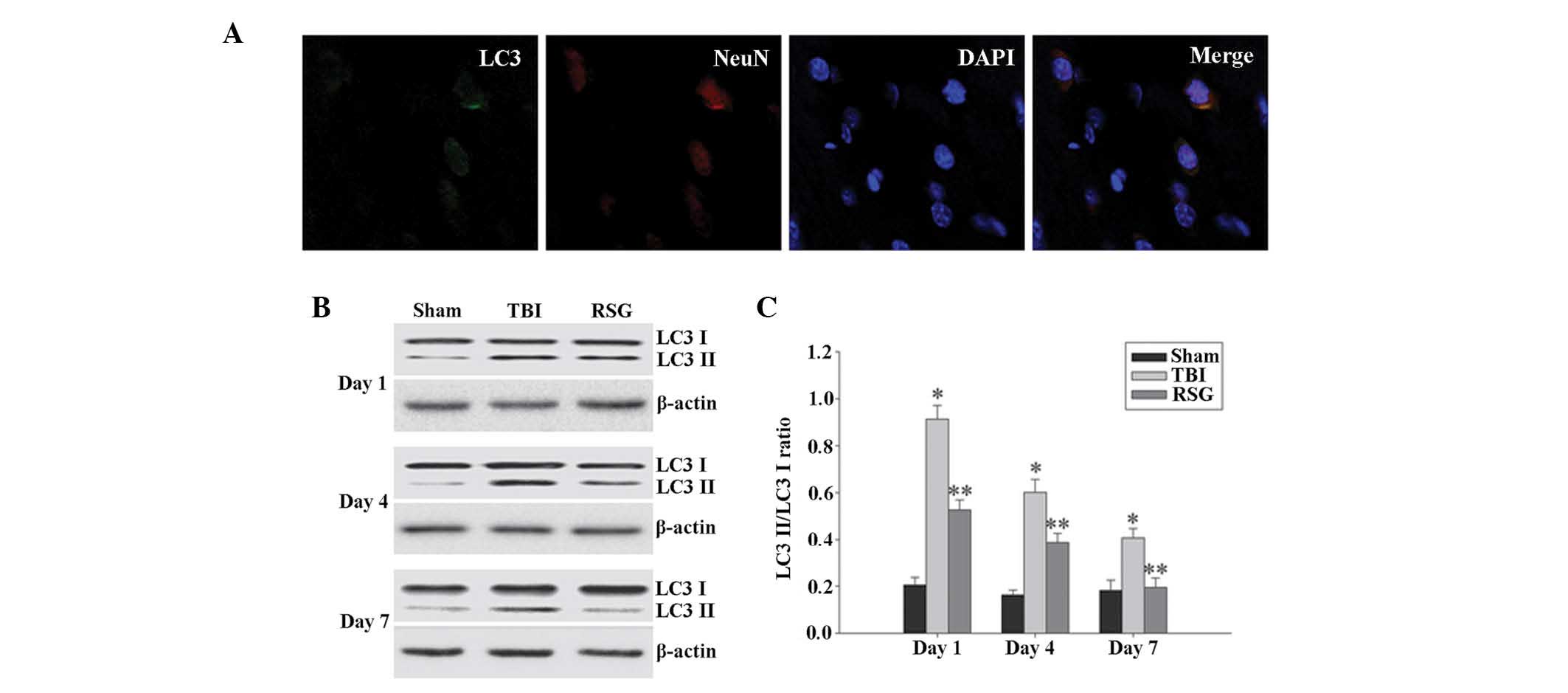|
1
|
Liu Y, Yi XC, Guo G, Long QF, Wang XA,
Zhong J, Liu WP, Fei Z, Wang DM and Liu J: Basic fibroblast growth
factor increases the transplantation-mediated therapeutic effect of
bone mesenchymal stem cells following traumatic brain injury. Mol
Med Rep. 9:333–339. 2014.
|
|
2
|
Greve MW and Zink BJ: Pathophysiology of
traumatic brain injury. Mt Sinai J Med. 76:97–104. 2009. View Article : Google Scholar : PubMed/NCBI
|
|
3
|
Gaetz M: The neurophysiology of brain
injury. Clin Neurophysiol. 115:4–18. 2004. View Article : Google Scholar : PubMed/NCBI
|
|
4
|
Headrick JP, Bendall MR, Faden AI and Vink
R: Dissociation of adenosine levels from bioenergetic state in
experimental brain trauma: Potential role in secondary injury. J
Cereb Blood Flow Metab. 14:853–861. 1994. View Article : Google Scholar : PubMed/NCBI
|
|
5
|
Khan M, Im YB, Shunmugavel A, Gilg AG,
Dhindsa RK, Singh AK and Singh I: Administration of
S-nitrosoglutathione after traumatic brain injury protects the
neurovascular unit and reduces secondary injury in a rat model of
controlled cortical impact. J Neuroinflammation. 6:322009.
View Article : Google Scholar : PubMed/NCBI
|
|
6
|
Cui C, Cui Y, Gao J, Sun L, Wang Y, Wang
K, Li R, Tian Y, Song S and Cui J: Neuroprotective effect of
ceftriaxone in a rat model of traumatic brain injury. Neurol Sci.
35:695–700. 2014. View Article : Google Scholar
|
|
7
|
Wang YQ, Wang L, Zhang MY, Wang T, Bao HJ,
Liu WL, Dai DK, Zhang L, Chang P, Dong WW, et al: Necrostatin-1
suppresses autophagy and apoptosis in mice traumatic brain injury
model. Neurochem Res. 37:1849–1858. 2012. View Article : Google Scholar : PubMed/NCBI
|
|
8
|
Rink A, Fung KM, Trojanowski JQ, Lee VM,
Neugebauer E and McIntosh TK: Evidence of apoptotic cell death
after experimental traumatic brain injury in the rat. Am J Pathol.
147:1575–1583. 1995.PubMed/NCBI
|
|
9
|
Clark RS, Kochanek PM, Watkins SC, Chen M,
Dixon CE, Seidberg NA, Melick J, Loeffert JE, Nathaniel PD, Jin KL
and Graham SH: Caspase-3 mediated neuronal death after traumatic
brain injury in rats. J Neurochem. 74:740–753. 2000. View Article : Google Scholar : PubMed/NCBI
|
|
10
|
Graham SH, Chen J and Clark RS: Bcl-2
family gene products in cerebral ischemia and traumatic brain
injury. J Neurotrauma. 17:831–841. 2000. View Article : Google Scholar : PubMed/NCBI
|
|
11
|
Clark RS, Bayir H, Chu CT, Alber SM,
Kochanek PM and Watkins SC: Autophagy is increased in mice after
traumatic brain injury and is detectable in human brain after
trauma and critical illness. Autophagy. 4:88–90. 2008. View Article : Google Scholar
|
|
12
|
Cao Y and Klionsky DJ: Physiological
functions of Atg6/Beclin 1: A unique autophagy-related protein.
Cell Res. 17:839–849. 2007. View Article : Google Scholar : PubMed/NCBI
|
|
13
|
Mohanty P, Aljada A, Ghanim H, Hofmeyer D,
Tripathy D, Syed T, Al-Haddad W, Dhindsa S and Dandona P: Evidence
for a potent antiinflammatory effect of rosiglitazone. J Clin
Endocrinol Metab. 89:2728–2735. 2004. View Article : Google Scholar : PubMed/NCBI
|
|
14
|
Risner ME, Saunders AM, Altman JF, Ormandy
GC, Craft S, Foley IM, Zvartau-Hind ME, Hosford DA and Roses AD;
Rosiglitazone in Alzheimer's Disease Study Group: Efficacy of
rosiglitazone in a genetically defined population with
mild-to-moderate Alzheimer's disease. Pharmacogenomics J.
6:246–254. 2006.PubMed/NCBI
|
|
15
|
Schütz B, Reimann J, Dumitrescu-Ozimek L,
Kappes-Horn K, Landreth GE, Schürmann B, Zimmer A and Heneka MT:
The oral antidiabetic pioglitazone protects from neurodegeneration
and amyotrophic lateral sclerosis-like symptoms in superoxide
dismutase-G93A transgenic mice. J Neurosci. 25:7805–7812. 2005.
View Article : Google Scholar : PubMed/NCBI
|
|
16
|
Chaturvedi RK and Beal MF: PPAR: A
therapeutic target in Parkinson's disease. J Neurochem.
106:506–518. 2008. View Article : Google Scholar : PubMed/NCBI
|
|
17
|
Luo Y, Yin W, Signore AP, Zhang F, Hong Z,
Wang S, Graham SH and Chen J: Neuroprotection against focal
ischemic brain injury by the peroxisome proliferator-activated
receptor-gamma agonist rosiglitazone. J Neurochem. 97:435–448.
2006. View Article : Google Scholar : PubMed/NCBI
|
|
18
|
Zhang Q, Hu W, Meng B and Tang T: PPARγ
agonist rosiglitazone is neuroprotective after traumatic spinal
cord injury via anti-inflammatory in adult rats. Neurol Res.
32:852–859. 2010. View Article : Google Scholar : PubMed/NCBI
|
|
19
|
Yi JH, Park SW, Brooks N, Lang BT and
Vemuganti R: PPARgamma agonist rosiglitazone is neuroprotective
after traumatic brain injury via anti-inflammatory and
anti-oxidative mechanisms. Brain Res. 1244:164–172. 2008.
View Article : Google Scholar : PubMed/NCBI
|
|
20
|
Stoica BA and Faden AI: Cell death
mechanisms and modulation in traumatic brain injury.
Neurotherapeutics. 7:3–12. 2010. View Article : Google Scholar : PubMed/NCBI
|
|
21
|
Xu M and Zhang HL: Death and survival of
neuronal and astrocytic cells in ischemic brain injury: A role of
autophagy. Acta Pharmacol Sin. 32:1089–1099. 2011. View Article : Google Scholar : PubMed/NCBI
|
|
22
|
Erlich S, Alexandrovich A, Shohami E and
Pinkas-Kramarski R: Rapamycin is a neuroprotective treatment for
traumatic brain injury. Neurobiol Dis. 26:86–93. 2007. View Article : Google Scholar : PubMed/NCBI
|
|
23
|
Lai Y, Hickey RW, Chen Y, Bayir H,
Sullivan ML, Chu CT, Kochanek PM, Dixon CE, Jenkins LW, Graham SH,
et al: Autophagy is increased after traumatic brain injury in mice
and is partially inhibited by the antioxidant
gamma-glutamylcysteinyl ethyl ester. J Cereb Blood Flow Metab.
28:540–550. 2008. View Article : Google Scholar
|
|
24
|
Csuka E, Morganti-Kossmann MC, Lenzlinger
PM, Joller H, Trentz O and Kossmann T: IL-10 levels in
cerebrospinal fluid and serum of patients with severe traumatic
brain injury: Relationship to IL-6, TNF-alpha, TGF-beta 1 and
blood-brain barrier function. J Neuroimmunol. 101:211–221. 1999.
View Article : Google Scholar : PubMed/NCBI
|
|
25
|
He J, Evans CO, Hoffman SW, Oyesiku NM and
Stein DG: Progesterone and allopregnanolone reduce inflammatory
cytokines after traumatic brain injury. Exp Neurol. 189:404–412.
2004. View Article : Google Scholar : PubMed/NCBI
|
|
26
|
Palmer AM, Marion DW, Botscheller ML,
Swedlow PE, Styren SD and DeKosky ST: Traumatic brain
injury-induced excitotoxicity assessed in a controlled cortical
impact model. J Neurochem. 61:2015–2024. 1993. View Article : Google Scholar : PubMed/NCBI
|
|
27
|
Yi JH and Hazell AS: Excitotoxic
mechanisms and the role of astrocytic glutamate transporters in
traumatic brain injury. Neurochem Int. 48:394–403. 2006. View Article : Google Scholar : PubMed/NCBI
|
|
28
|
Rao VL, Başkaya MK, Doğan A, Rothstein JD
and Dempsey RJ: Traumatic brain injury down-regulates glial
glutamate transporter (GLT-1 and GLAST) proteins in rat brain. J
Neurochem. 70:2020–2027. 1998.PubMed/NCBI
|






















